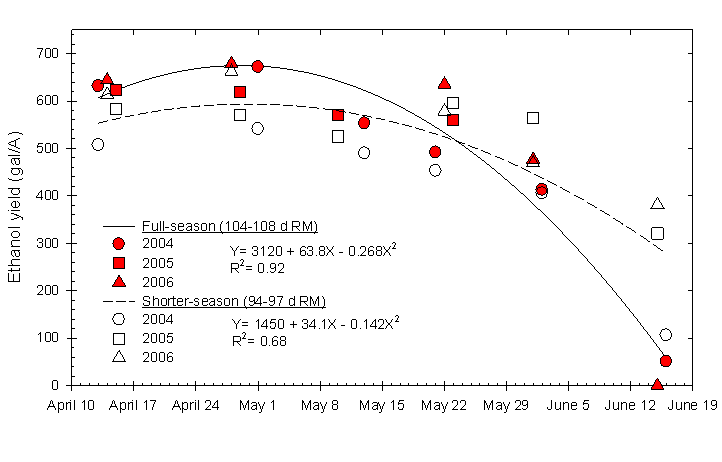
Corn Ethanol Yield Response to Planting Date
May 17, 2007
Joe Lauer, Corn Agronomist
When to begin planting is an important decision in managing corn. During the month
of May we typically see a grain yield decrease of 30%. Not only does yield decrease,
but grain moisture increases adding drying costs and decreasing profitability. What
is not well understood are other risks that can influence this decision. Risks that
can change dramatically as planting date is delayed include increased pest pressure
(especially insects such as corn rootworm), increased lodging potential, greater
chance of poor kernel set which in turn lowers grain yield and reduces test weight.
Grain yield ultimately integrates many of these risks. Last week we described what
happens to grain yield as planting date is delayed. This week I want to describe
what happens to ethanol yield (Figure 1). At Arlington, ethanol yield is maximized
by planting around May 1. The planting window when ethanol yield is still within
95% of the date when maximum ethanol yield occurs, is about 10 days before and after
May 1. Like grain yield, ethanol yield decreases as planting is delayed. By June
1 one-third of the potential ethanol production is lost. The response is more dramatic
for full-season hybrids than for shorter-season hybrids. Around May 25 shorter-season
hybrids produce more ethanol yield than full-season hybrids. Maturity switch dates
for corn ethanol yield are similar to the switch dates for corn grain yield.
The major driver for corn ethanol yield is grain yield. Planting date affects both
grain yield and ethanol yield. From a processing perspective, it also affects recoverable
ethanol per bushel of grain. Recoverable ethanol ranged from 2.8 to 2.9 gallons
per bushel during May, but only 2.6 to 2.8 gallons per bushel in June. So June planted
corn has both reduced ethanol yield and recoverable ethanol.

Figure 1. Corn ethanol yield response to planting date and relative maturity
(RM) at Arlington, WI.